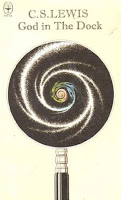 |
| (Amazon UK link) |
However this particular book isn't one of his best. To be fair, it was never intended as a book. It's a collection of Lewis's articles and talks on various topics, which don't really hold together. Realising this, I didn't try to read it straight through - instead I read a chapter or two each day for a couple of weeks. The chapters are short, and I enjoy his intellectual but clear style of writing.
There were some gems in the early sections: comments about miracles, for instance, both in the Bible and in modern times. Nothing that he didn't write in his entire book about Miracles, but still thought-provoking and interesting. Lewis presents his arguments logically, and most of what he writes makes good sense.
I wasn't so impressed with the later chapters. There is one about women ministers ('priestesses' as he calls them) for instance. Now I realise Lewis was writing in the 1940s, and at the time it was almost unthinkable that the Anglican church would ever allow women to be ordained. It did indeed cause controversy when it was eventually permitted.
But Lewis's objections were not to do with the likely chaos that would result. Nor was it due to classical male chauvinism. Indeed, he makes it quite clear that he believes women to be every bit as good as men (if not better) in many pastoral roles. He believes they can and should visit the sick, pray, teach, even preach.
His objections spring from what I think must be an Anglo-Catholic doctrine, that of a priest representing God to the people, almost in the way that an Old Testament Jewish priest did. Lewis feels that without an overall masculinity in God, the Bible falls apart. Perhaps he's stating what was self-evident to Christians of his time, but his arguments seem rather lacking today. Indeed, the chapter he wrote made me all the more convinced that there is a place for women ministers at all levels.
I was also a bit irritated by the final chapter, where he keeps distinguishing the 'educated' population from the 'uneducated' masses, by which he means manual labourers who - at the time - probably left school at the age of about 12 or 14. I don't think Lewis was a snob as such, although he admits to being an intellectual and not always in touch with ordinary people. But the chapter does come across rather condescendingly in places. It was probably fine fifty years ago.
All in all, not a great introduction to CS Lewis's writing, but a nice addition for a collector of his works.
No comments:
Post a Comment